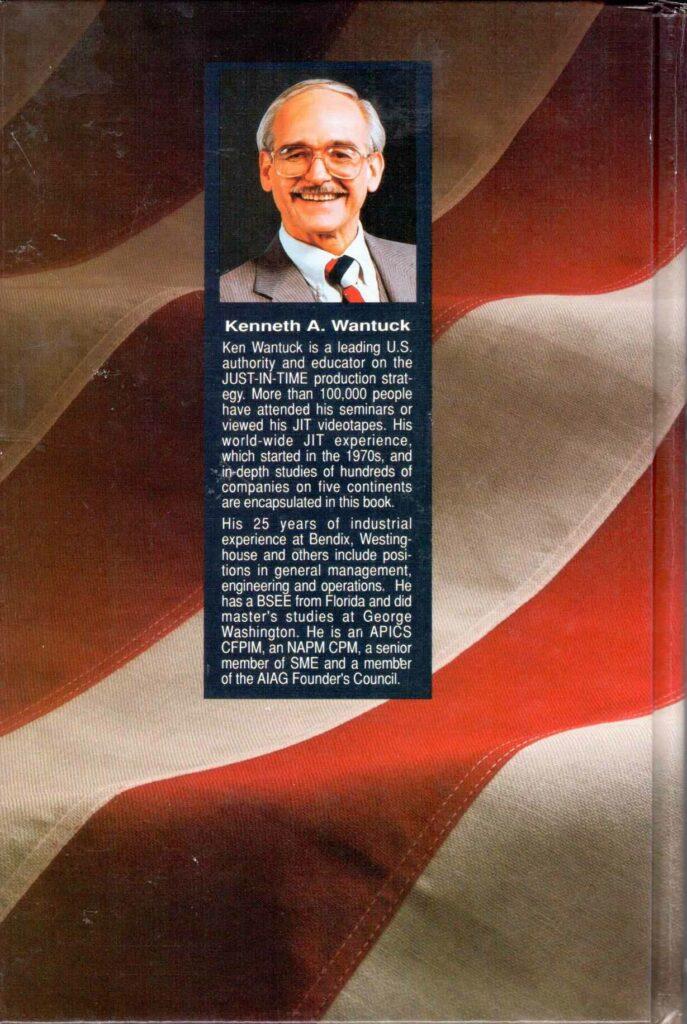Have you ever heard of Kenneth Wantuck? If not, I’d like to introduce him to you.

Ken, age 77, is the author of a wonderful, comprehensive book, Just-In-Time For America, describing how to implement Just-In-Time. The book was published in 1989. Ken was one of the very few early authors to cite the importance of respect for people in JIT (which, today, of course, we call Lean). The title of the book is an interesting play on words, reflecting America’s need for Just-In-Time to revitalize manufacturing, and how this new management practice comes at just the right time.
First, a little background on how Ken got to know about JIT. In 1980, Ken was a manager at Bendix in Detroit assigned to the materials management organization to fix inventory problems. One day, an accountant comes to his office to show him a financial report from a Bendix subsidiary, Jidosha Kiki Corporation (JKC). Their performance numbers were much better than other Bendix plants; double the productivity and 5 times greater inventory turns. Neither Ken nor the accountant thought the numbers were real.
Ken was quickly assigned a new job of figuring out how JKC, a Toyota first-tier supplier, got such good numbers. Ken got on a plane and went to Japan to visit JKC, but thought the actual task would be to “teach them how to fill out corporate reports” since such good numbers must have been erroneous.
Given what I have told you so far, you would think that Ken’s focus would be solely on the methods and tools of continuous improvement which yielded the good numbers. It was not. He was interested to know everything. Not just all the technical aspects of JIT, but all the human aspects as well.

JKC was a generous host and told Ken everything he wanted to know. So Ken asked, “Why are you telling me all this?” The answer from a JKC managers was: “Because you won’t do it. We are anxious to share, but most people are not interested in the details.” Indeed. Ken, however, was interested in the details. So he spent the next eight years learning about JIT, making many more trips to Japan. He learned JIT very well.
Returning to the human aspect of JIT, which, of course, has long interested me most, let me share with you a few excerpts from Ken’s fine book:
- JIT Principle 5: Respect People. “The source of the continuous improvement we seek is our people. There is a gold mine of innovation available if we learn how to uncover it. The key is respect… People must be given the respect, stable environment, and motivation to contribute their ideas to the organization.” (Chapter 2, The Just-In-Time Strategy, p. 29, 30)
- “…company policies must recognize and address the need for [employment] security if we expect to unleash the creative energies that our people can contribute.” (Chapter 4, People Policies and Practices, p. 75)
- “In Just-In-Time, since people are thought of as an investment or a ‘sunk cost’ rather than a variable cost, this concept [pay for capability] not only makes heavy training a wise investment, it gradually equates capability with longevity.” (Chapter 4, People Policies and Practices, p. 77)
- “Job security, a stable work force, highly qualified hires, extensive training, pay for capability and job flexibility will help build a stable work environment to satisfy people’s fundamental needs.” (Chapter 4, People Policies and Practices, p. 77)
- “The important thing to remember is layoffs should be the LAST RESORT, not the first option.” Bold and italics in original. (Chapter 4, People Policies and Practices, p. 81)
- “Management Policies must establish a stable environment that is free from fear of job loss. They must be aimed at developing mutual trust, a team spirit, mutual objectives and dependency, sharing of both hardships and gains, and pride in everything the organization stands for and does.” (Chapter 4, People Policies and Practices, p. 102)
- “Management Practices must begin with a holistic attitude about people, their worth and potential to contribute from an intellectual standpoint.” (Chapter 4, People Policies and Practices, p. 102)
Chapter 4 brilliantly covers all the important elements of People Policies and Practices for JIT. I hope you will get a copy of Ken’s book. If you want multiple copies, you can purchase them directly from Ken. Contact him at [email protected].
